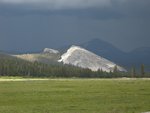Klondike Gold Rush National Historical Park (AK)
NPS And Parks Canada Rangers Rescue Poisoned Hikers
Last Wednesday evening, five hikers were evacuated from the Chilkoot Trail by helicopter and treated for poisoning following a hasty community rescue involving several agencies, a local helicopter company, and Parks Canada. While backpacking 13 miles into the Chilkoot Trail, five hikers consumed varying small amounts of the root bulb of the highly toxic false hellebore (Veratrum viride). False hellebore is reported to be the most toxic plant along the Northwest coast and can be lethal when consumed in just small quantities. Although only the person who ate the most had serious symptoms (vomiting and intestinal problems), all five felt minor burning sensations in their mouths and throats and also had gas. Rangers were changing shifts when the incident occurred and not near the camp, but Sean Cox, a Parks Canada ranger, was hiking on the US side of the trail as part of his orientation tour and came upon the hikers just minutes from the Sheep Camp ranger station and helispot. Personal knowledge of local plants aided his assessment of the seriousness of the medical status of the five hikers and quickened his determination to get them promptly evacuated. The park's trail center helped the Skagway-based rangers to coordinate a helicopter evacuation, which was aided by Skagway EMT's and community clinic staff. As the evacuation developed, park natural resource staff researched the toxicity of and treatment recommendations for false hellebore poisoning, which produced vital information for the nurse practitioners at the clinic. Despite marginal cloud ceiling levels and worsening weather conditions, a TEMSCO helicopter pilot was able to use his local knowledge and experience to navigate the mountainous terrain and safely evacuate all five to Skagway. When they arrived in Skagway, the most serious patient was in critical condition and a second began to present with symptoms. All five were treated and the three asymptomatic hikers were released that same night. The two symptomatic patients were stabilized and transported to Whitehorse, Yukon Territory, for further treatment and evaluation. They were released two days later. The National Park Service would like to extend its recognition and gratitude to all of those involved in the rescue effort, including Parks Canada, TEMSCO Helicopters, Skagway Emergency Services and the Dahl Memorial Clinic.
NPS And Parks Canada Rangers Rescue Poisoned Hikers
All posts are those of the individual authors and the owner
of this site does not endorse them. Content should be considered opinion
and not fact until verified independently.
Sorry, only registered users may post in this forum.


